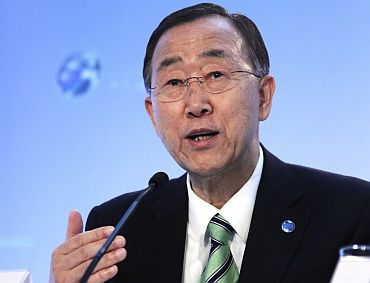 United Nations chief Ban Ki-moon on Monday expressed concern over restrictions imposed on travelers returning from Ebola-affected countries, saying people who develop infections should be "supported, not stigmatised".
United Nations chief Ban Ki-moon on Monday expressed concern over restrictions imposed on travelers returning from Ebola-affected countries, saying people who develop infections should be "supported, not stigmatised".
The UN secretary general said that the restrictions put particular pressure on health care workers and those who have been on the frontline of the Ebola response. "The Secretary-General is concerned by the recent restrictions put in place in several countries and localities applying to people who have travelled to the main Ebola-affected countries," a statement issued by Ban's spokesman said.
"Returning health workers are exceptional people who are giving of themselves for humanity. They should not be subjected to restrictions that are not based on science," he said in the statement.
"Those who develop infections should be supported, not stigmatised," he added. Ban reiterated that the best way for any country to protect itself from Ebola is to stop the outbreak at its source in West Africa. "This requires considerable international health care worker support and in return for this support, we have anobligation to look after them," he said.
According to the UN World Health Organisation's latest situation report, there have been 9,936 cases of Ebola and 4,877 deaths so far. In New York, after a doctor who treated Ebola patients returned from Guinea and tested positive for the virus, state government had put in place a mandatory 21-day quarantine for travellers returning from the most-affected West African countries.
New York Governor Andrew Cuomo came in for sharp criticism from health experts and had to loosen restrictions, allowing asymptomatic medical workers who had contact with Ebola patients in West Africa to remain at home during the quarantine period.
New Jersey Governor Chris Christie also faced backlash after a nurse who arrived from Sierra Leone last week was swiftly quarantined in a tent set up inside a Newark hospital, with a portable toilet but with no shower.
Ban is currently in Addis Ababa, Ethiopia, at the start of a joint trip uniting the capacities of the United Nations, World Bank, European Union, Islamic Development Bank, and African Development Bank and targeting a swathe of countries in the Horn of Africa, spanning Djibouti, Eritrea, Ethiopia, Kenya, Somalia, South Sudan, Sudan and Uganda.
Ban announced a new $8 billion development initiative aimed at boosting economic growth, reducing poverty and spurring business activity across the African region's eight countries.
As aid workers and medical personnel return to their countries after working to provide treatment to Ebola patients in West Africa, several restrictions have been put on their movement by governments as they aim to prevent the spread of the virus.










